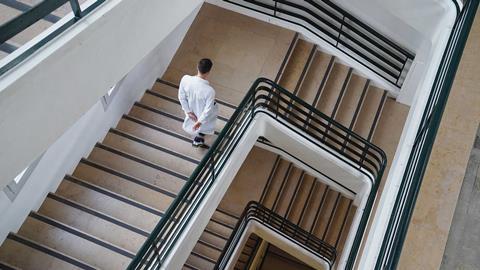A sole psychiatrist faces seemingly unsurmountable odds in a challenging hospital outside Paris

Dir: Nicolas Peduzzi. France. 2023. 93mins
The Beaujon public hospital in Clichy, a suburb four miles northwest of central Paris, was regarded as a towering achievement of modern architecture on its opening in 1935, one of the first medical institutions to break away from traditional cottage hospitals and reach into the sky. Today, however, Beaujon is an institution on its knees - budget cuts and understaffing have taken their toll. In this intense fly-on-the wall documentary which follows the hospital’s idealistic psychiatrist Dr Jamal Abdel-Kader, Nicolas Peduzzi (Southern Belle, Ghost Song) paints a damning portrait of how public services are being strangled by an ever-tighter bottom line.
Hope against impossible odds
On The Edge is an urgent, timely film which should appeal to further festivals. Despite the specifically French healthcare setting — something it shares with Nicolas Philibert’s Golden Bear winner On The Adamant and Claire Simon’s Berlin title Our Body — the universal nature of the issues on display, not to mention the dogged determination of its likeable protagonist, should also help the film travel following its jury special mention at CPH:DOX.
Almost the entirety of the documentary takes place within the claustrophobic walls of Beaujon hospital, an imposing building which houses a rabbit warren of departments and staircases, doors and wards. Within them strides 34-year-old Jamal, the son of Syrian immigrants and the sole psychiatrist working across a multitude of patients, many of whom are referred after being admitted for other ailments.
Some are violent and need restraint, like the man who attempted to strangle himself with his own earphones while in police custody. Many are quietly lost in their own despair, like the vulnerable Dutch woman terrified to return to her Maastricht home. And many have attempted suicide, including Aliénor, who survived jumping from a bridge only to face the anger of her family, who feel betrayed by her actions — and her addiction to drugs.
Throughout, the handheld camera maintains the same compassion and respect as shown by Jamal, sometimes remaining tight on his sympathetic face or catching conversations in reflections and open doorways. The film doesn’t linger particularly long on any of the patients, and we don’t discover anything more about them than what they divulge. While Jamal gives each patient attention and respect, he must make life-changing judgements in the moment — and treatment is often limited by a lack of both money and time.
This lack of support, both financial and emotional, has also driven Jamal and his colleagues to the brink themselves. He and nurses aide Romain have candid, angry conversations about management’s misplaced priorities, burnt out colleagues and the impact on their own mental health. Emotive effects, such as split screens, disorienting blurs and overlapping fades, together with Gael Rakotondrabe’s pulsing soundtrack underscore the pressure and the feeling that giving your all is never quite enough.
And yet, for many, it is. Jamal’s theatre-slash-therapy group provides support and friendship; it is with wry irony that patients perform the suicide scene from ‘Romeo and Juliet’ — shared catharsis about a shared experience. “What we do here is a metaphor for society,” says Jamal and, as Peduzzi peppers the film with black and white stills of doctors and patients, lingering on moments of genuine connection, it’s an acknowledgement that extraordinary people like Jamal can indeed provide hope against impossible odds.
Production companies: Gogogo Films
International sales: Lightdox hello@lightdox.com
Producer: Carine Ruszniewski
Cinematography: Nicolas Peduzzi, Laetitia Montalembert
Editing: Nicolas Sburlati
Music: Gael Rakotondrabe
























